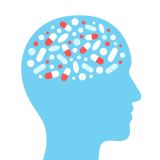In this article:
What is a Psychopharmacology Degree?
A psychopharmacology degree focuses on the study of how medications affect the brain and behavior. This field combines psychology, neuroscience, and pharmacology to understand how different drugs influence mood, cognition, and mental health disorders. Students learn about the effects of medications used to treat conditions like depression, anxiety, schizophrenia, and ADHD.
Throughout the program, students explore the chemistry of drugs, how they interact with the nervous system, and their potential benefits and risks. Courses often cover subjects like neurobiology, drug metabolism, and the development of psychiatric medications. The degree also emphasizes ethical considerations and the responsible use of medications in mental health treatment.
Program Options
Psychopharmacology programs are typically available at the graduate level and are designed for those pursuing careers in psychology, psychiatry, neuroscience, or pharmaceutical sciences.
- Master of Science (MS) in Psychopharmacology: This graduate program provides advanced training in the use of medications for mental health treatment. It is often designed for licensed psychologists or healthcare professionals who want to expand their understanding of psychiatric medications and their effects on the brain.
- Doctor of Psychology (PsyD) with a Specialization in Psychopharmacology: A PsyD program with a focus on psychopharmacology prepares clinical psychologists to integrate medication knowledge into their practice. While they do not prescribe medication in most states, they gain a deep understanding of how drugs interact with psychological treatments.
- Doctor of Philosophy (PhD) in Psychopharmacology or Neuroscience: A PhD program in psychopharmacology or a related field focuses on research and the scientific study of how drugs affect mental health. These programs are ideal for those interested in academia, pharmaceutical research, or developing new treatments for psychiatric disorders.
- Postdoctoral Certificate in Clinical Psychopharmacology: This program is designed for licensed psychologists seeking to gain expertise in prescribing medications, where state laws permit. It provides additional education in neuroscience, pharmacology, and clinical applications of psychotropic drugs.
Skills You’ll Learn
A degree in psychopharmacology equips students with a diverse set of skills that are valuable in various career paths related to the study and application of psychoactive drugs. Here are some of the key skills you can expect to learn:
- Understanding Drug Mechanisms: Students learn how different medications interact with the nervous system, including their effects on neurotransmitters, brain function, and mental health conditions.
- Medication Assessment and Management: The program teaches how to evaluate the effectiveness, side effects, and risks of psychiatric medications used for treating disorders like depression, anxiety, and schizophrenia.
- Neurobiology and Pharmacokinetics: Students gain knowledge of how drugs are absorbed, distributed, metabolized, and excreted by the body, as well as how genetic and biological factors influence drug responses.
- Clinical and Ethical Decision-Making: Those in the program develop skills in determining when medications are appropriate, how to combine them with therapy, and the ethical considerations of prescribing or recommending treatments.
- Research and Data Analysis: Many programs emphasize conducting research on new psychiatric medications, analyzing clinical trials, and understanding how scientific studies shape medication guidelines and mental health treatments.
What Can You Do with a Psychopharmacology Degree?
A psychopharmacology degree prepares individuals to work in clinical, research, and pharmaceutical settings, focusing on how medications affect mental health and behavior. Graduates may work in healthcare, academia, or drug development.
- Clinical Psychopharmacologist: Works with psychiatrists, psychologists, and other healthcare providers to assess and manage the use of psychiatric medications for mental health conditions.
- Pharmaceutical Scientist: Works in the development, testing, and optimization of new psychiatric medications, collaborating with researchers and drug manufacturers to bring effective treatments to market.
- Neuroscientist: Studies how medications interact with the brain and nervous system, researching the biological mechanisms behind psychiatric and neurological disorders.
- Clinical Psychologist (with additional training and licensure): Some psychologists pursue postdoctoral certification in clinical psychopharmacology to integrate medication knowledge into their mental health practice.

